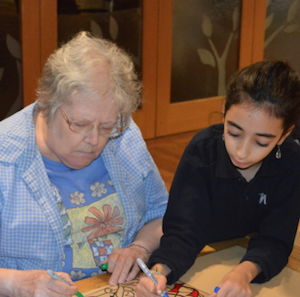As a harvest festival, Sukkot is infused with thanksgiving for the bounty that Jews in Canada and, mercifully, in most of the world today, enjoy. The holiday is also an earthy affair, as we move out into our backyards (or, in some cases caused by this hot housing market, our sliver of a balcony) and into temporary shelters inspired by those used by the Israelites during the 40 years of exodus in the desert. The emphasis of the sukkah is on impermanence and inhabiting one, even if just for a meal, inspires reflection on the impermanence in our lives, including life itself.
Sukkot is immediately followed by Shemini Atzeret and Simchat Torah – and the juxtaposition is striking. On Simchat Torah, we celebrate the most permanent thing the Jewish people have experienced. On this day, we complete the annual reading of the Torah and immediately begin again, missing not a beat between the end of Devarim, Deuteronomy, and the beginning of Bereisheet, Genesis.
For a people who have known – who, indeed, have just finished a week of reenacting – historical impermanence, Simchat Torah is a reassurance that, in the face of all historical, social and technological change, at least one thing remains constant: the book that binds us in spirit and practice.
The Torah is a constant in times of change, and it is easy to take for granted that, in the long history of the Jewish people, we are living out one of the most dramatic epochs our people has ever known. For millennia, our forebears yearned for Zion, longing to celebrate next year in Jerusalem and to be a free people in our land. In our generation, this dream has come to pass.
The creation of the state of Israel has changed Jews, Judaism and Jewish practices in small and large ways. One of the most significant ways is the sense of permanence provided by a Jewish homeland. Yet, there have been times of war and terror when the dream has turned nightmarish. And there remain many in the world who would like Israel to be an impermanent way station, merely another sukkah, for the Jewish people.
Jews – in Israel and around the world – are determined that Israel should remain as permanent and enduring as the Torah. Yet, unlike the Torah, which has a definitive beginning and end, Israel’s borders are not recognized by the international community, nor is there a consensus in Israel about where precisely they should be in the event of a final status agreement for a two-state solution.
While Jews worldwide were contemplating construction of their sukkot, the United States and others were condemning Israel’s recent announcement of additional housing construction in East Jerusalem.
Such settlements do nothing to convince the world that Israel is acting in good faith vis-à-vis a two-state outcome. On the other hand, condemning construction as the primary obstacle to peace in the region is a difficult pill to swallow: there are more pressing impediments to peace on both sides of the conflict.
However, while settlements may not be the main impediment to peace, they are an attempt to build something relatively permanent in a region without clear borders. It seems a considerable waste of resources – human labor, building materials, money, time, even Israeli and Palestinian PR efforts and goodwill – to keep building, especially knowing that the area is disputed and, therefore, impermanent.
Such construction also raises the hopes and dreams of those who ultimately will live there – what happens if they are forced to move? Israel has demonstrated its willingness to uproot Jewish residents in Sinai and Gaza in exchange for the faint hope of peace.
Through history and ritual, Jews understand that most things are temporary, like settlements that eventually give way to compromise. We also understand that some things are meant to last, like Torah and like the irreversible redemption of the Jewish people to the land of Israel.
 Just before Sukkot, the Grade 6 and 7 girls of Vancouver Hebrew Academy were warmly welcomed to Louis Brier Home and Hospital, where they visited with the residents and worked on a special project. Together, the students and residents created stained glass-style decorations for the Louis Brier’s sukkah.
Just before Sukkot, the Grade 6 and 7 girls of Vancouver Hebrew Academy were warmly welcomed to Louis Brier Home and Hospital, where they visited with the residents and worked on a special project. Together, the students and residents created stained glass-style decorations for the Louis Brier’s sukkah.
